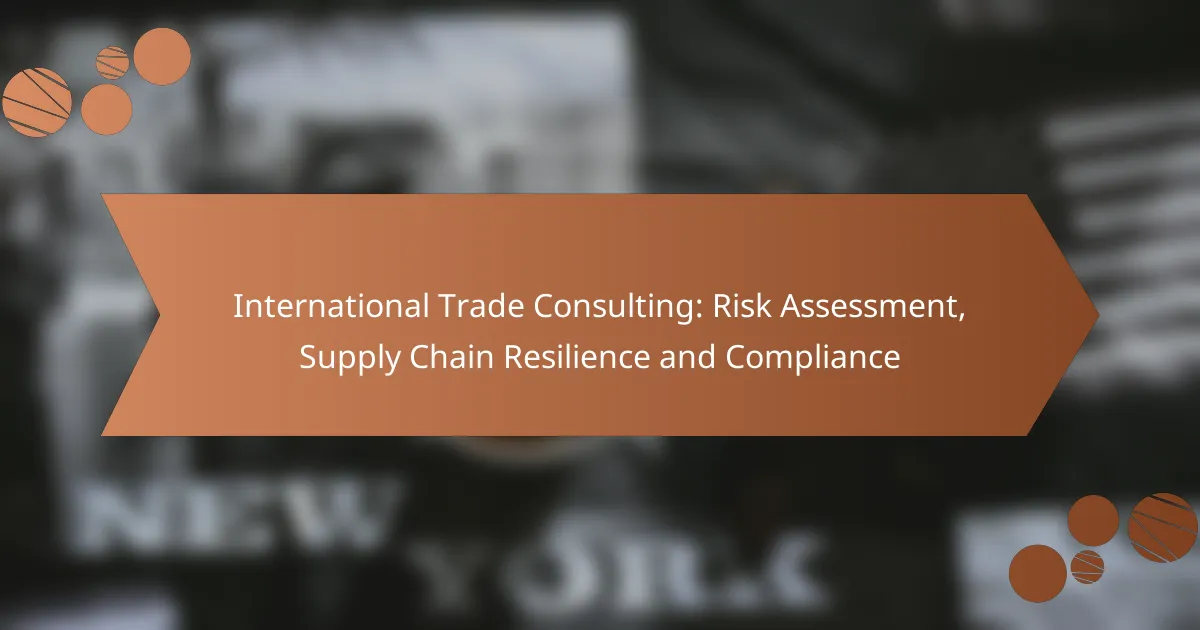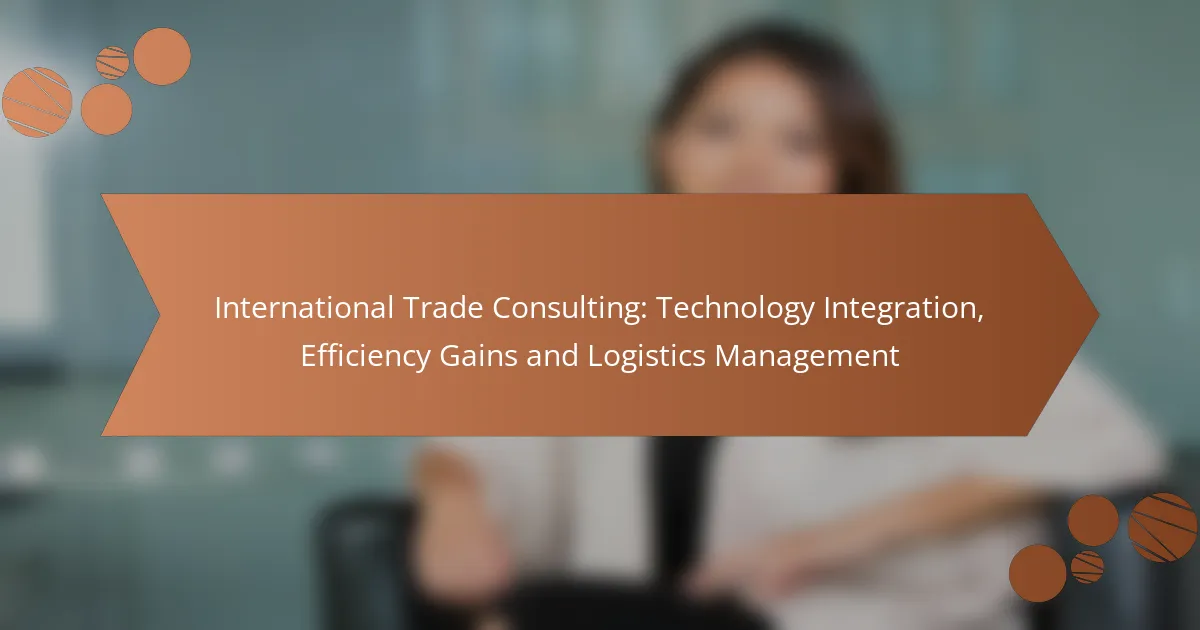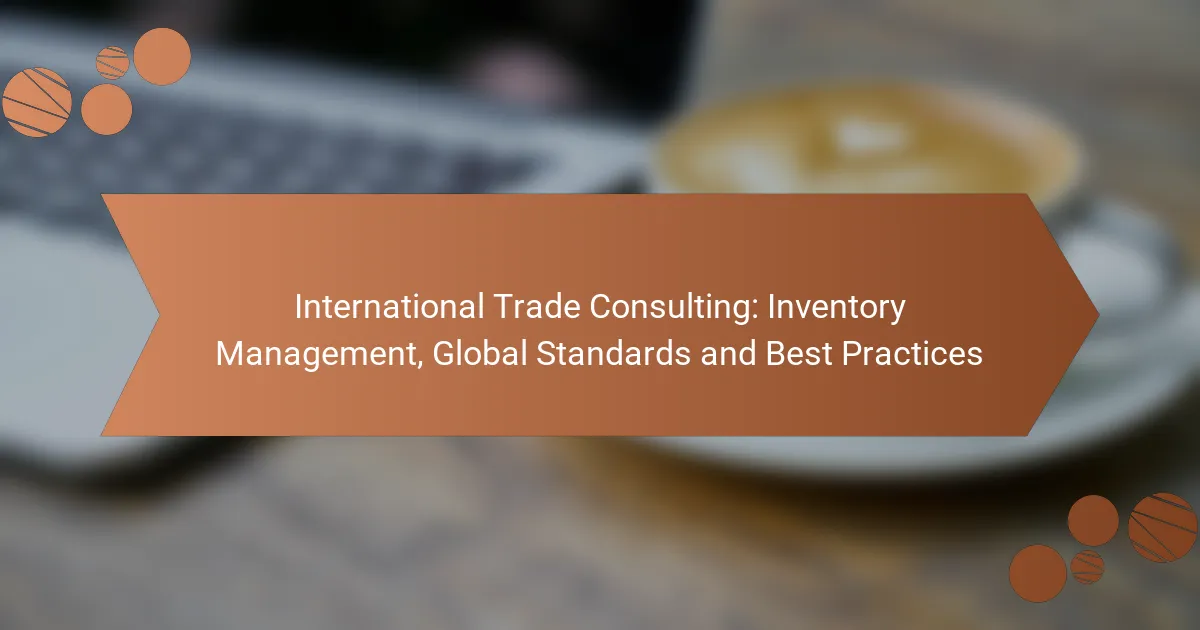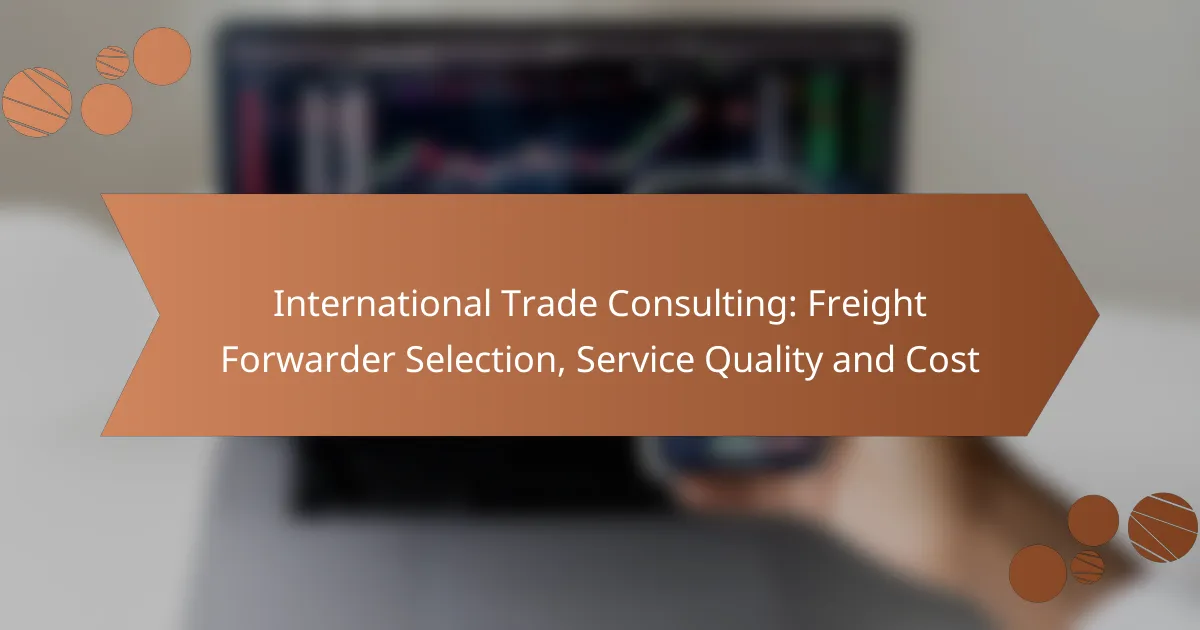International trade consulting plays a vital role in navigating the complexities of global commerce by focusing on risk assessment, supply chain resilience, and compliance. By identifying potential threats and evaluating their impact, businesses can maintain operational integrity and mitigate financial losses. Implementing best practices for supply chain resilience and ensuring adherence to regulatory standards are essential for fostering smooth and efficient cross-border transactions.
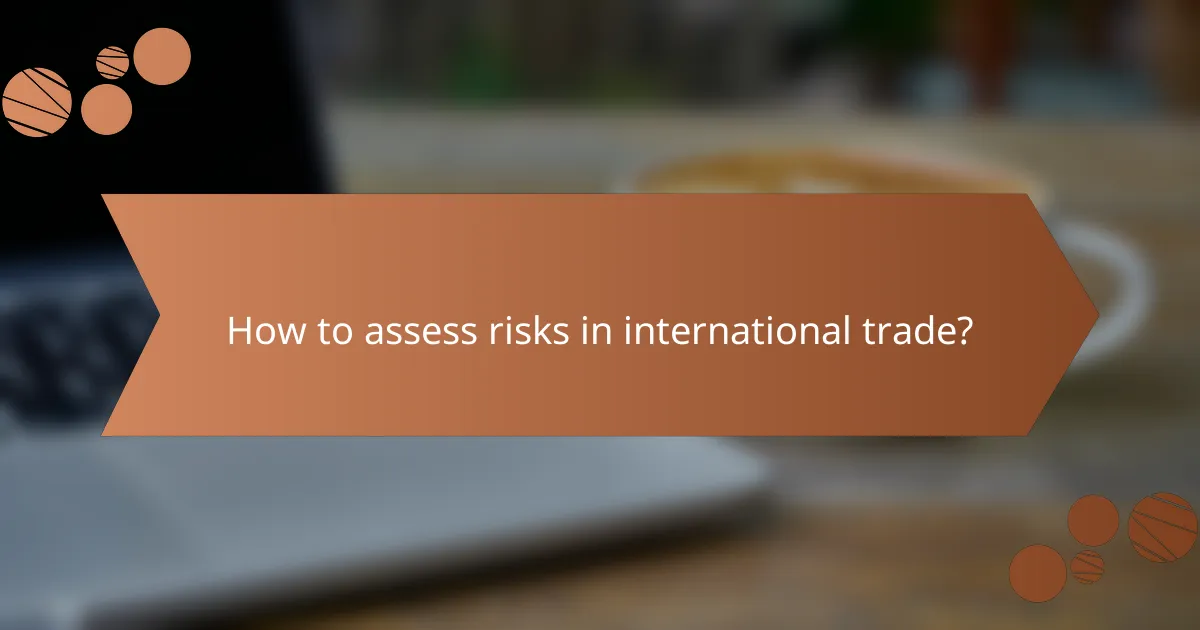
How to assess risks in international trade?
Assessing risks in international trade involves identifying potential threats to operations and evaluating their impact on business objectives. This process is crucial for maintaining compliance, ensuring supply chain resilience, and mitigating financial losses.
Risk identification techniques
Risk identification techniques help businesses pinpoint potential risks in their international trade activities. Common methods include brainstorming sessions, expert interviews, and SWOT analysis (Strengths, Weaknesses, Opportunities, Threats). Each technique encourages collaboration and diverse perspectives to uncover hidden risks.
Another effective approach is to conduct scenario analysis, where businesses envision various adverse situations, such as political instability or supply chain disruptions. This method helps in recognizing vulnerabilities and preparing appropriate responses.
Risk analysis frameworks
Risk analysis frameworks provide structured methodologies for evaluating identified risks. One popular framework is the Risk Matrix, which categorizes risks based on their likelihood and impact. This visual tool helps prioritize risks, enabling businesses to focus on the most critical threats first.
Another widely used framework is the ISO 31000 standard, which outlines principles and guidelines for risk management. Adopting such frameworks ensures a systematic approach to risk assessment, promoting consistency and thoroughness in evaluations.
Tools for risk assessment
Various tools are available to assist in risk assessment for international trade. Software solutions like risk management platforms can automate data collection and analysis, providing real-time insights into potential risks. These tools often include features for scenario modeling and risk reporting.
Additionally, businesses can utilize checklists to systematically evaluate risks across different categories, such as regulatory compliance, financial stability, and supply chain integrity. A well-structured checklist can streamline the assessment process and ensure no critical areas are overlooked.
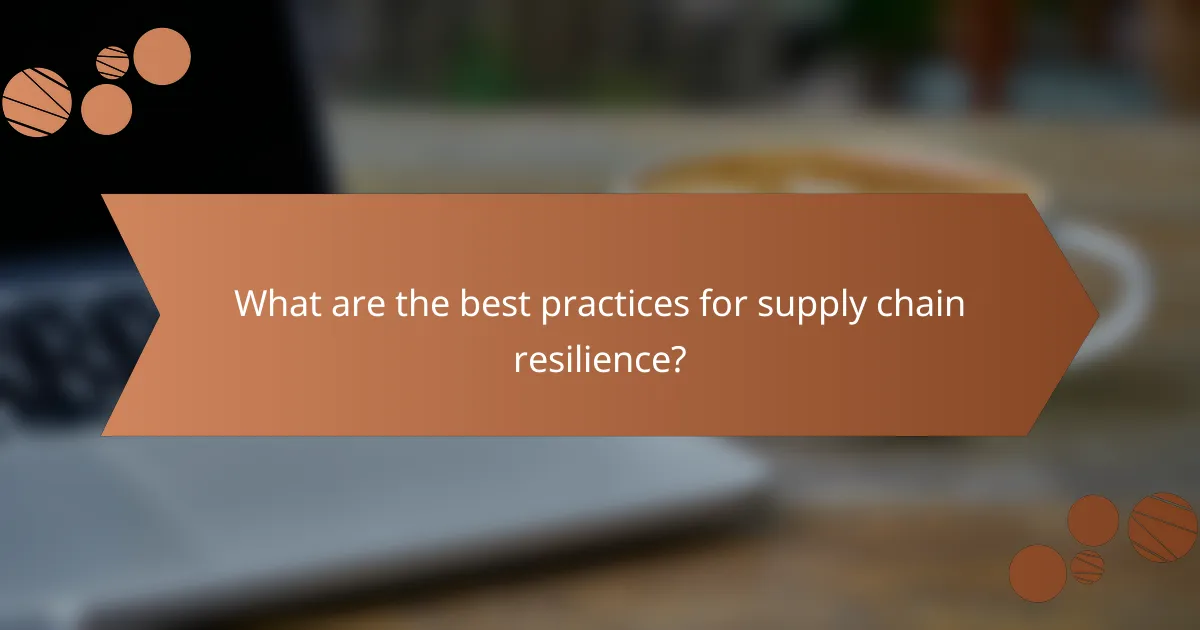
What are the best practices for supply chain resilience?
Best practices for supply chain resilience focus on proactive risk management, flexibility, and collaboration among stakeholders. Companies should assess vulnerabilities, diversify suppliers, and implement robust contingency plans to mitigate disruptions.
Strategies for enhancing resilience
Enhancing supply chain resilience involves several key strategies. First, companies should conduct regular risk assessments to identify potential vulnerabilities in their supply chains. This includes evaluating suppliers, logistics, and geopolitical factors that could impact operations.
Diversifying suppliers is another effective strategy. Relying on a single source can lead to significant risks; therefore, having multiple suppliers from different regions can help mitigate disruptions. Additionally, building strong relationships with suppliers fosters collaboration and quick responses to unforeseen challenges.
Case studies of resilient supply chains
Several companies exemplify resilience in their supply chains. For instance, a major automotive manufacturer successfully navigated supply chain disruptions during a global crisis by quickly shifting to alternative suppliers and increasing inventory levels for critical components.
Another example is a leading consumer goods company that invested in local sourcing to reduce dependency on international shipping. This strategy not only improved their responsiveness but also reduced lead times and transportation costs.
Technologies for supply chain management
Technological advancements play a crucial role in enhancing supply chain resilience. Implementing supply chain management software can provide real-time visibility into inventory levels, supplier performance, and logistics, enabling quicker decision-making.
Additionally, technologies such as artificial intelligence and machine learning can predict potential disruptions by analyzing data patterns. These insights allow companies to proactively adjust their strategies and maintain continuity in operations.

How to ensure compliance in international trade?
Ensuring compliance in international trade involves adhering to regulations and standards that govern cross-border transactions. This includes understanding customs laws, trade agreements, and industry-specific requirements to avoid penalties and facilitate smooth operations.
Key compliance regulations
Key compliance regulations in international trade include the Customs Modernization Act, the Export Administration Regulations (EAR), and the International Traffic in Arms Regulations (ITAR). These regulations dictate how goods can be exported and imported, ensuring that businesses operate within legal frameworks.
Additionally, the Foreign Corrupt Practices Act (FCPA) and the Anti-Bribery Convention are crucial for maintaining ethical standards in international dealings. Companies must stay informed about these regulations to mitigate risks associated with non-compliance.
Steps for compliance audits
Conducting compliance audits involves several critical steps. First, businesses should identify applicable regulations and standards relevant to their operations. Next, they should perform a thorough review of their processes and documentation to ensure alignment with these regulations.
Regular audits should include checking for proper record-keeping, verifying that all necessary licenses and permits are in place, and assessing employee training on compliance matters. Establishing a schedule for these audits can help maintain ongoing compliance and identify areas for improvement.
Compliance management software
Compliance management software can streamline the process of ensuring adherence to international trade regulations. These tools often include features for tracking regulatory changes, managing documentation, and automating compliance checks.
When selecting compliance management software, consider factors such as user-friendliness, integration capabilities with existing systems, and the ability to generate reports for audits. Popular options include SAP GRC, ComplyAdvantage, and LogicGate, which can help businesses maintain compliance efficiently and effectively.

What criteria should be considered for selecting a trade consultant?
Selecting a trade consultant requires careful consideration of their expertise, industry experience, and proven track record. Key criteria include their understanding of specific markets, compliance with regulations, and the ability to enhance supply chain resilience.
Experience in specific industries
When evaluating a trade consultant, prioritize their experience in your specific industry. A consultant with a background in sectors like manufacturing, agriculture, or technology will better understand the unique challenges and regulations you face.
For example, a consultant experienced in the European Union’s trade regulations can provide insights into compliance requirements for businesses exporting goods to EU countries. This specialized knowledge can significantly reduce risks associated with international trade.
Client testimonials and case studies
Client testimonials and case studies are vital for assessing a trade consultant’s effectiveness. Look for feedback from businesses similar to yours, as this can indicate how well the consultant understands your needs.
Case studies showcasing successful projects can illustrate the consultant’s problem-solving capabilities and their approach to risk management. For instance, a case study detailing how a consultant helped a company navigate tariff changes can provide confidence in their expertise.
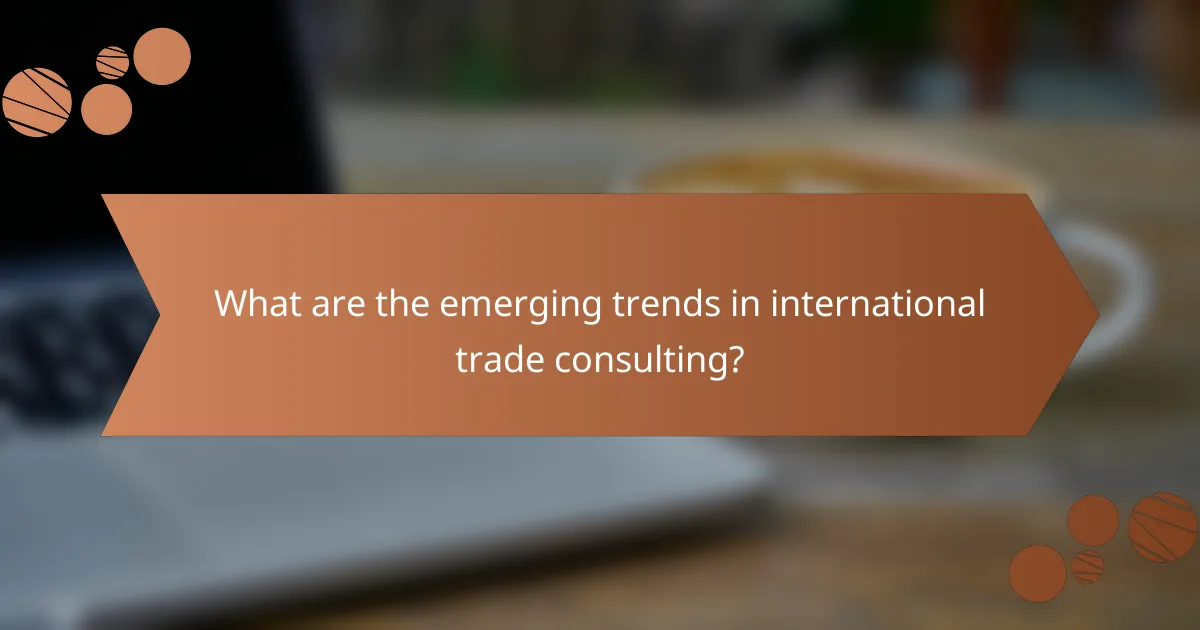
What are the emerging trends in international trade consulting?
Emerging trends in international trade consulting focus on enhancing risk assessment, improving supply chain resilience, and ensuring compliance with evolving regulations. These trends are driven by digital transformation, changing trade regulations, and innovations in global supply chains.
Impact of digital transformation
Digital transformation is reshaping international trade consulting by enabling real-time data analysis and automation. Companies are increasingly adopting technologies like artificial intelligence and blockchain to streamline operations and enhance transparency.
For instance, AI can predict supply chain disruptions by analyzing market trends, while blockchain ensures secure and traceable transactions. Businesses should invest in these technologies to stay competitive and responsive to market changes.
Future of trade regulations
The landscape of trade regulations is evolving, with countries implementing stricter compliance measures and tariffs. This shift requires companies to stay informed about regulatory changes to avoid penalties and ensure smooth operations.
Consultants should guide businesses in navigating these complexities by developing compliance strategies tailored to specific markets. Regular training and updates on regulations can help organizations adapt quickly to new requirements.
Global supply chain innovations
Innovations in global supply chains are crucial for enhancing resilience and efficiency. Companies are exploring alternative sourcing strategies, such as nearshoring and diversification, to mitigate risks associated with geopolitical tensions and natural disasters.
Additionally, the adoption of advanced logistics solutions, like automated warehousing and predictive analytics, can optimize inventory management. Firms should evaluate their supply chain strategies regularly to incorporate these innovations and improve overall performance.
